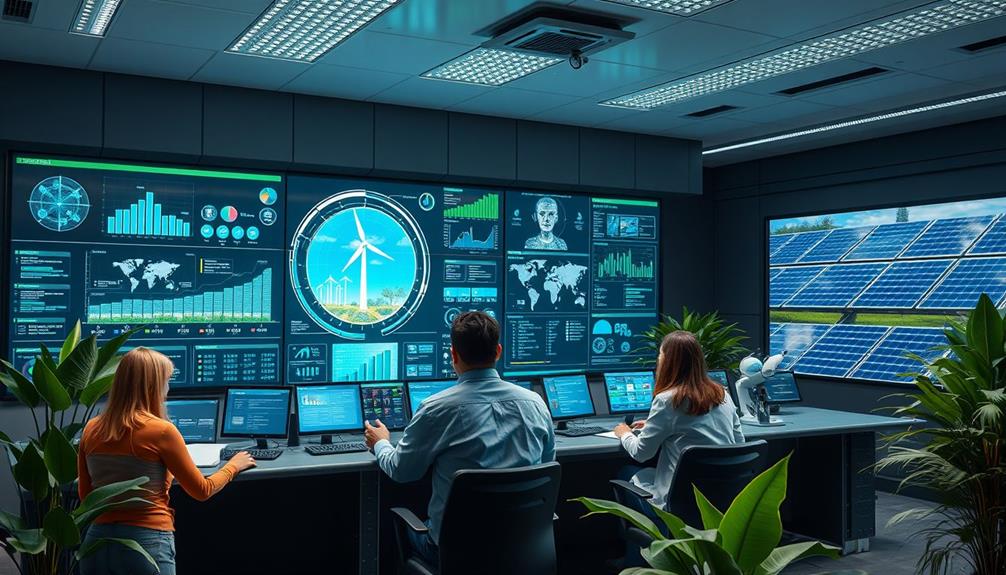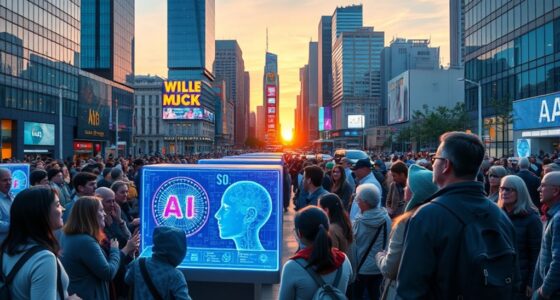AI-powered energy management helps you enhance efficiency and sustainability in your business or school. By leveraging machine learning and predictive analytics, you can analyze real-time energy consumption, leading to potential savings of up to 30%. Integrating smart technologies allows for better monitoring, reducing energy costs and minimizing your carbon footprint. AI also automates systems like HVAC and lighting, ensuring peak performance based on occupancy. This not only cuts expenses but also aligns with your sustainability goals. Want to discover additional ways AI can transform energy management for you?
Key Takeaways
- AI-driven solutions can reduce energy consumption in businesses and schools by up to 30%, leading to significant cost savings.
- Predictive analytics enable organizations to forecast energy needs, optimizing resource use and enhancing operational efficiency.
- Smart building technologies integrate IoT devices for real-time monitoring, improving energy management and reducing environmental impact.
- AI supports better tracking and reporting of greenhouse gas emissions, facilitating sustainability initiatives and compliance with regulations.
- Implementing AI in schools can unlock grant funding opportunities, promoting investments in energy-efficient infrastructures.
Understanding AI in Energy Management
AI is revolutionizing energy management, making it smarter and more efficient. With advanced AI technologies, particularly machine learning, you can analyze real-time consumption patterns, optimizing energy processes for your business or home.
These energy management systems provide predictive analytics that simulate human intelligence, forecasting future energy needs based on historical data. This capability improves your operational planning, allowing you to make informed decisions. As organizations seek to enhance their cybersecurity measures, cybersecurity challenges also impact energy management systems, necessitating robust defenses against potential threats.
By leveraging AI-driven insights, you gain better control over energy distribution and consumption, leading to significant energy savings and cost reduction. Smart building technology, integrated with IoT devices, collects and monitors data, enhancing energy efficiency and reliability.
You can track your energy usage more effectively, minimizing waste and maximizing utility. Implementing these AI-driven solutions can cut your energy costs by up to 30%, while also contributing to a decrease in greenhouse gas emissions by as much as 25%.
As a result, you're not just saving money; you're also playing a part in a more sustainable future. Understanding how AI enhances energy management empowers you to harness these benefits for your organization or home, paving the way for smarter energy practices.
Benefits of AI for Sustainability

By incorporating AI-driven solutions, organizations can greatly enhance their sustainability efforts. AI for energy management is revolutionizing how you approach energy consumption, allowing you to reduce energy consumption by up to 30%. With predictive analytics, you can anticipate energy usage trends, leading to actionable insights that profoundly improve operational efficiency. This not only helps in cutting costs but also in minimizing greenhouse gas emissions by as much as 25%.
Additionally, gout management insights can lead to healthier lifestyle choices that complement energy-saving measures.
Implementing AI in your sustainability initiatives supports better tracking and reporting of emissions reductions, making it easier for you to demonstrate your commitment to green practices. For schools, adopting AI-driven energy management can open doors to grant funding opportunities, strengthening your financial foundation while ensuring resources are allocated effectively for educational purposes.
Moreover, integrating smart building technologies with AI optimizes energy use in real-time, automating systems like lighting and HVAC to enhance energy efficiency. By leveraging these advancements, you can create a more sustainable environment that benefits both your organization and the planet.
Embracing AI for energy isn't just a smart choice—it's a necessary step towards achieving long-term sustainability goals.
Innovations in Smart Buildings

When you consider innovations in smart buildings, energy optimization technologies play an essential role in enhancing efficiency.
By utilizing systems such as geothermal energy generation, these buildings can harness the Earth's heat, providing a reliable and eco-friendly energy source.
By integrating smart infrastructure, these buildings not only cut energy costs but also reduce their environmental impact.
This shift towards intelligent systems creates a more sustainable future for all.
Energy Optimization Technologies
Innovative energy optimization technologies are transforming smart buildings into highly efficient environments that greatly reduce energy consumption. By leveraging AI-driven energy efficiency, these buildings can achieve energy savings of up to 30%. They dynamically adjust lighting and HVAC systems based on real-time data regarding occupancy and environmental conditions, optimizing energy production and usage.
Additionally, adopting a holistic approach to energy management, akin to the best lifestyle for heart health, emphasizes the importance of regular monitoring and proactive maintenance, further enhancing overall efficiency.
The integration of IoT devices enables continuous monitoring of energy usage patterns, allowing for proactive maintenance through predictive analytics. This not only reduces operational costs but also identifies inefficiencies and recommends improvements, markedly cutting down greenhouse gas emissions.
Automated energy management systems utilize machine learning to forecast energy demand, ensuring that resources are allocated effectively to meet sustainability goals. Notable innovations like phase change materials for thermal regulation and advanced lighting systems that adapt to natural light levels further enhance energy solutions.
These technologies contribute to a substantial reduction in your organization's carbon footprint, making smart buildings not just efficient but also environmentally responsible. Embracing these energy optimization technologies can set your business or school on a path toward a more sustainable future.
Smart Infrastructure Benefits
Smart buildings are redefining our approach to infrastructure, offering a range of benefits that enhance both efficiency and sustainability. By leveraging IoT devices and AI Energy Management systems, these buildings can optimize energy management to achieve notable energy savings. According to McKinsey, there's potential for a 20% reduction in building energy use.
In addition, innovations in heat pump technology are contributing to enhanced energy efficiency, allowing for better thermal energy transfer and lower operational costs.
AI technologies automate lighting and HVAC systems, adapting to real-time occupancy and environmental conditions. This means you can enjoy a comfortable environment while maximizing energy efficiency.
Moreover, predictive maintenance powered by AI anticipates equipment failures, considerably reducing operational costs and improving system reliability.
The integration of advanced materials and AI-driven energy management can lower energy costs by up to 30%. With smart buildings, you gain real-time monitoring of energy usage, providing data-driven insights that support proactive decision-making.
This continuous improvement in sustainability efforts not only cuts costs but also aligns your operations with environmental goals.
In a world increasingly focused on sustainability, embracing smart buildings is a step towards a more efficient, cost-effective future.
AI in Sustainable Transportation

The integration of AI technologies into sustainable transportation systems is transforming how we navigate our cities. By optimizing route planning and traffic management, AI notably reduces fuel consumption and lowers greenhouse gas emissions.
In addition, incorporating RV living for preppers can enhance mobility during emergencies, allowing for quick adjustments in transportation logistics. You can expect energy savings of up to 15% when AI is implemented in transportation logistics, enhancing efficiency and sustainability.
AI-driven solutions also promote cleaner energy use by facilitating the integration of electric and autonomous vehicles into existing transportation networks. This shift reduces reliance on fossil fuels, making urban environments healthier and more sustainable.
With predictive analytics, AI can forecast traffic patterns and demand, allowing for smarter public transit scheduling and resource allocation.
Moreover, smart traffic management systems equipped with AI help decrease congestion and improve travel times. This not only enhances urban mobility but also leads to better air quality, benefiting everyone in the community.
Enhancing Manufacturing Efficiency

Manufacturing efficiency is undergoing a revolution, thanks to AI-driven solutions that boost productivity while markedly cutting energy consumption. With tools like Noodle.ai's Steel Mill AI, you can achieve impressive energy reductions of up to 30%. This not only lowers operational costs but also enhances your resource management.
AI technologies help you identify inefficiencies in your processes through predictive maintenance, allowing you to address potential equipment failures before they lead to costly downtime and wasted energy.
By refining supply chain logistics, AI reduces transportation emissions and improves material usage efficiency. You'll find that real-time data analysis empowers you to adapt to demand fluctuations, ensuring ideal energy consumption and minimizing excess resource usage.
Implementing these AI solutions in your manufacturing operations isn't just about saving energy; it's about creating a sustainable future. As you embrace these advancements, you'll notice a significant improvement in your overall operational efficiency.
Agricultural Innovations With AI

As industries embrace AI to enhance efficiency and reduce energy consumption, agriculture is also experiencing transformative innovations through these technologies.
AI can help farmers optimize livestock production by analyzing feeding patterns and health data, leading to a significant energy reduction in methane emissions by up to 20%. Tools like Global Forest Watch utilize AI for monitoring deforestation, enabling you to make informed decisions that promote sustainable agriculture.
Additionally, aspiring herbalists can explore herbalism programs that teach sustainable practices for herbal cultivation, complementing AI-driven agricultural methods.
Precision agriculture powered by AI predicts crop yields and optimizes resource usage, potentially increasing productivity by 15-25% while minimizing environmental impact.
You'll find that AI-driven solutions improve pest detection and management, reducing the need for chemical pesticides and fostering eco-friendly farming practices.
Moreover, AI-powered irrigation systems can cut water usage by up to 30%, contributing to more sustainable water management in farming.
By leveraging these AI innovations, you not only achieve cost savings but also play a vital role in enhancing the overall sustainability of your agricultural practices.
Embracing these technologies can lead to a more efficient, environmentally responsible, and resilient agricultural sector.
Waste Management Optimization

While you may not think about it every day, optimizing waste management is essential for both cost savings and environmental sustainability. By integrating artificial intelligence into your waste management systems, you can considerably reduce costs and improve operational efficiency.
Technologies like Enevo's Waste Analytics can optimize waste collection routes, leading to cost savings of up to 30% and a reduction in greenhouse gas emissions. Additionally, adopting healthy lifestyle practices can complement your waste management efforts by promoting sustainable behaviors within your organization.
AI-driven solutions, such as EMAGIN's HARVI system, utilize sensor data to enhance waste treatment processes. This means you're not just managing waste more effectively; you're also reducing energy use and emissions by up to 20%.
Real-time monitoring software helps you track and analyze waste production, enabling data-driven decisions that support sustainability. In addition, AI tools can identify high-value opportunities within your waste management strategies, allowing you to prioritize initiatives that deliver the greatest environmental benefits.
Future Trends in Energy Management

In the coming years, you'll likely see a significant transformation in energy management driven by artificial intelligence. This evolution utilizes machine learning to enhance efficiency and optimize energy consumption. By leveraging predictive analytics, organizations can forecast the future of their energy needs and achieve potential savings of up to 30%.
As AI applications in various industries continue to expand, energy management will also benefit from innovative solutions that guarantee sustainability.
You'll benefit from:
- Advanced materials and AI-driven retrofitting that improve energy performance in older buildings.
- Smart grid technologies that enable you to control energy distribution more effectively.
- Continuous monitoring that tracks your carbon footprint and adjusts strategies accordingly.
With these advancements, you'll not only cut costs but also contribute to a more sustainable future.
The collaboration between technology providers and educational institutions will be crucial in implementing these AI-driven solutions. Embracing these trends means you can expect a more streamlined energy management process that adapts to your specific needs.
As AI continues to evolve, you'll find innovative ways to improve energy efficiency and sustainability in your organization, paving the way for a greener tomorrow.
Frequently Asked Questions
How Does AI Make Businesses Sustainable?
AI makes your business sustainable by identifying energy efficiency opportunities, optimizing usage patterns, and forecasting consumption trends. It helps you reduce costs, minimize emissions, and enhance operational efficiency, ultimately supporting your sustainability goals and environmental impact.
How Is AI Used in Energy Management?
Think of AI as a wise owl, observing energy patterns. It analyzes real-time data, predicts needs, and automates controls, helping you manage consumption effectively and cut costs while boosting efficiency and sustainability in your operations.
How Does Energy Management Help Sustainability?
Energy management helps sustainability by optimizing resource use, reducing waste, and lowering emissions. By implementing effective strategies, you can save costs and contribute to a healthier environment, ensuring a better future for everyone.
How Can We Use AI Technology to Make Greener Energy?
You can use AI technology to optimize energy consumption by analyzing usage patterns, predicting future needs, and automating systems. This helps you reduce waste, lower costs, and ultimately create a greener energy environment.
Conclusion
In the ever-evolving landscape of energy management, AI acts like a compass, guiding businesses and schools toward sustainable solutions. By harnessing its power, you can not only reduce costs but also contribute to a healthier planet. As innovations continue to unfold, embracing these technologies will put you ahead of the curve. Don't just follow the trend; lead the charge toward a greener future, ensuring your organization thrives while making a positive impact on the environment.










